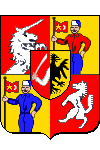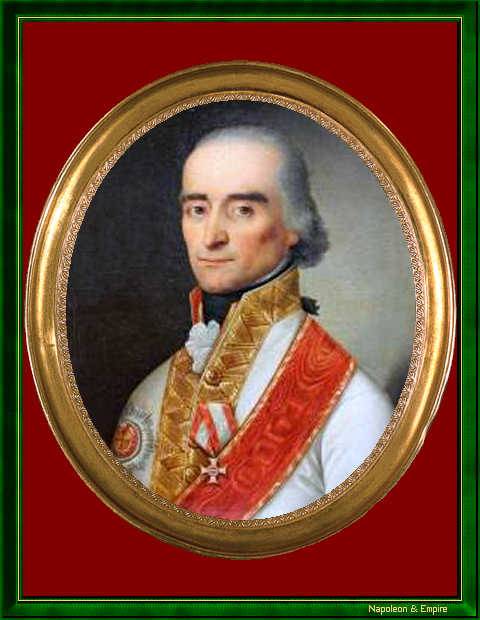Joseph Philipp Vukasović
Baron
Pronunciation:

Joseph Philipp Vukasović was born in 1755, perhaps on July 8. Sources differ on his birthplace. Some indicate Senj, others Sveti Petar [today Bruvno]. The Croatian Encyclopedia mentions Ličko Petrovo Selo, a small village in central Croatia, in the Lika region. In any case, he was the son of an infantry officer, and his mother came from a family of soldiers.
After training as a military engineer, he joined his father's regiment in 1775. Five years later, he was promoted to lieutenant. He was promoted to captain at the start of the war against the Turks (1787-1791), but the exact date of his appointment is unknown. He fought in Montenegro and Herzegovina, and on this occasion demonstrated sufficient qualities to be awarded the Knight's Cross of the Order of Maria Theresa, the highest Austrian military distinction of the time, on November 15, 1788.
Vukasović was made a baron in 1788, then raised a corps franc in which he served as major and then lieutenant-colonel.
Colonel in 1794, he fought in Italy, where he took part in the battle of Loano (November 23-24, 1795), then the following year in the battles of Montenotte (April 12, 1796) and Dego. During the latter, due to a badly-written order, he turned up the day after the French had taken the village. He managed to drive them out, but had to withdraw when the main French army attacked.
Shortly afterwards, on May 2, 1796, Vukasović was promoted to Generalmajor (brigadier general). Eight days later, he commanded the Austrian rearguard, which tried unsuccessfully to prevent the French from crossing the Lodi bridge. His brigade was also engaged at Borghetto. After the defeat, it took refuge in Mantua [Mantova], from where it emerged to reinforce the relief army at the battle of Castiglione.
Vukasović then took part in the last three Austrian attempts to unblock Mantua. During the first, he was part of Paul Davidovich's corps, which descended through the Adige valley. Andréa Masséna and Claude-Henri Belgrand de Vaubois drove him back to Neumarkt, enabling Napoleon Bonaparte to win the battle of Bassano a few days later. In the next battle, again under the command of Davidovich, he was once again pushed back into the Tyrol after some initial successes. Finally, during the last one, he was almost a spectator at the battle of Rivoli, through the fault of his commanding general, Josef Alvinczy von Borberek. Sending Vukasović's column to the left bank of the Adige prevented him from intervening effectively in the fighting.
When hostilities resumed between France and Austria, during the second coalition, Vukasović was once again employed in Italy. On April 28, 1799, at Verderio, he forced General Jean-Mathieu Philibert Sérurier and 3,000 of his men to lay down their arms. In the months that followed, many towns in north-west Italy opened their doors to him.
In October 1799, Vukasović was promoted to Feldmarschall-Leutnant (major general). During the second Italian campaign, he was driven out of Milan [Milano] by the arrival of the French, and withdrew to Brescia and Cremona [Cremona], which prevented him from taking part in the battle of Marengo.
Vukasović operates again in Italy during the Third Coalition, in the army of Archduke Charles of Austria. After the Battle of Verona [Verona] on October 18, 1805, he was dismissed by Archduke Charles, on the pretext of a faulty disposition of his troops. In 1809, however, the same general-in-chief put Vukasović in command of his army's 3rd Light Division. Vukasović justified this confidence during the battle of Eckmühlw and the operations that preceded it. Absent from Aspern-Essling, he fought at Wagram, where he was seriously wounded on the second day of the battle (July 6, 1809). He died in Vienna [Wien] on August 9.
Joseph Philipp Vukasović. Portrait anonyme.

As a military engineer, Vukasović was actively involved in the construction of numerous roads along the Croatian coast: Senj - Sveti Juraj (1783-1784), Senj - Novi Vinodolski (1785), Gospić - Karlobag (1786), Lujzinska road (1803-09, whose construction he supervised from Rijeka to Netretić). The latter was completed during the period when Illyria was attached to the French Empire. This activity earned him the reputation of "the greatest road builder in Croatian history".
Vukasović's name is found in various forms in the writings that mention him: Vukassovich, von Vukassovich, Wukassovich, Wukassovitch.